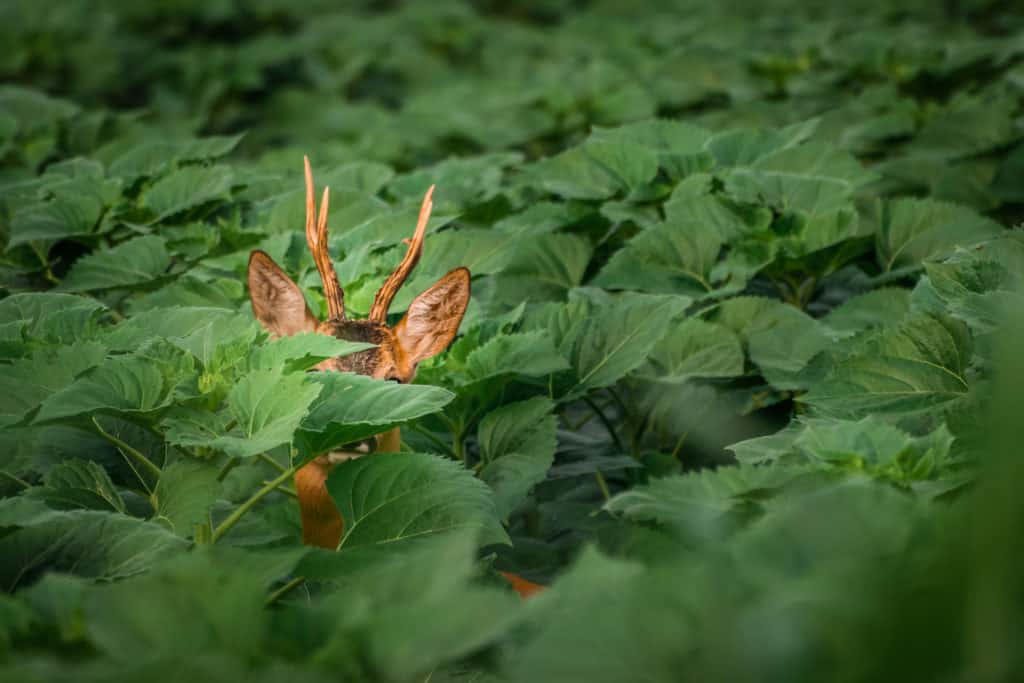Deer are a major problem in gardens around North America and beyond. One day a garden can be lush with fruits, vegetables, and other plants. The next day all of a gardener’s hard work can be destroyed by the indiscriminate taste buds of a local deer population.
Sunflowers are not only cherished for their unique beauty that is primarily due to their large flowering head, but also for their seeds and oil. Given their benefits, there are a lot of people concerned if deer will eat sunflowers when planted. Let’s take a look if sunflowers are safe from deer.
Table of Contents
Do deer eat sunflowers?

Sunflowers might not be the first plant that comes to mind when it comes to deer meal options. However, deer will eat sunflowers. In fact, no plant is immune from the potential of deer damage. If hungry enough, deer will eat any vegetation, especially when food is scarce.
When it comes to if deer will eat a particular plant, like a sunflower, it is a matter of preference. They definitely prefer certain plants over others when food is readily available.
Research has been completed on plants and their deer resistance. The Rutgers Cooperative Extension lists a rating of many different plants based on their resistance to deer damage. The ratings are: rarely damaged, seldom severely damaged, occasionally severely damaged, and frequently severely damage. Sunflower (Helianthus sp.) is rated as occasionally severely damaged by Rutgers.
We also referenced Michigan State University Extension as another source for data on deer damage to sunflowers. Their ratings for plants are as follows: rarely damaged, seldom severely damaged, occasionally damaged, and frequently damaged. Similar to the deer loving hostas, sunflowers are rated frequently damaged by deer by Michigan State University Extension.
Based on the two university extensions, it is clear that sunflowers are toward the top in regard to food preferences of deer. You should not expect your sunflower plants to be safe from damage, especially in an environment with a high deer population.
What part of the sunflower will deer eat?
The whole plant is fair game for deer. They are particularly fond of the leaves and young plants that are a couple feet tall. Additionally, the sunflower seeds and the immature head are also popular choices.
How to deter deer from sunflowers?
Since sunflowers are susceptible to deer damage, methods to keep deer away from the plants should be considered. Here are some common solutions for keeping your sunflowers free from damage.
Fencing
Deer can jump up to 8 feet so your fence will need to be at least that height. According to the University of Vermont, it can be shorter at around 6 feet but it will need to be slanted outward at approximately a 45° angle. The deer will walk up to the fence and think it is much taller because of the illusion from the angle. The fence looming over the body of the deer is enough to drive them off.
An electric fence can also be considered. The deer will be issued an electric shock when it walks up to the fence. This shock, if powerful enough, will likely be enough to drive off the deer and to condition it not to come back.
Repellent Sprays
Deer repellent sprays such as the popular Bobbex are applied directly to the plant. These sprays deter the deer from their unpleasant smell and taste that they produce on the plant.
The directions on these sprays must be strictly followed for satisfactory results. Many people forget to spray as directed or do not follow the directions and have undesirable results.
Additionally, these sprays are not always designed for every type of plant. Be sure to read the instructions before using them. This is especially true for edible plants.
Dogs
A dog that patrols the yard can be an excellent deterrent of deer. A few barks is typically all that is required for deer to run away. Of course, the problem with many dogs is that they won’t always be present when deer decide to encroach on your sunflowers. Furthermore, you run the risk of the dog chasing after the deer and getting lost or injured.
Motion-Activated Sprinklers
This type of sprinkler is activated by the motion of anything that walks in front of it. When placed in front of sunflowers, the sprinkler will startle the deer with the noise and spray of water. The Orbit 62100 is an example of a motion-activated sprinkler that works both day and night for 24 hour protection.
Conclusion
Sunflowers should not be planted in areas with deer unless you can accept that they will potentially be destroyed or if you they can be protected. Keep in mind that the days to maturity is about 60 days. There is a lot of opportunity for deer to have a feast if they happen to stumble upon the sunflowers.
However, given that they annuals and relatively inexpensive for home gardeners, it may be worth the risk of planting them where deer traffic is low to moderate. You may get lucky and be able to enjoy their beauty after all.


